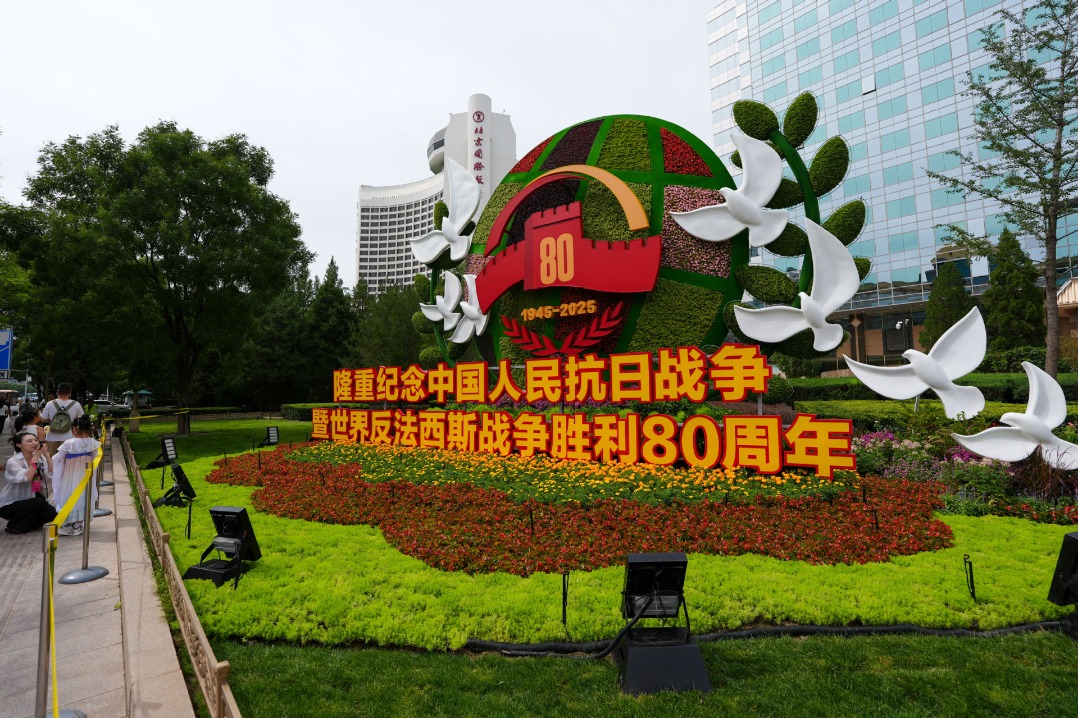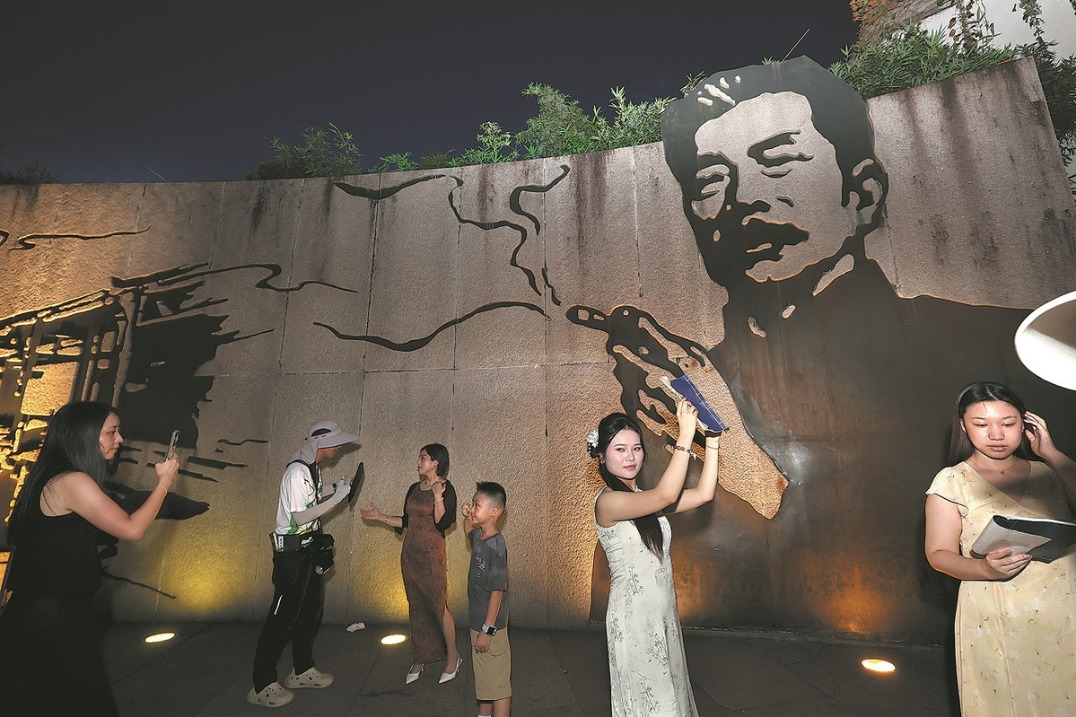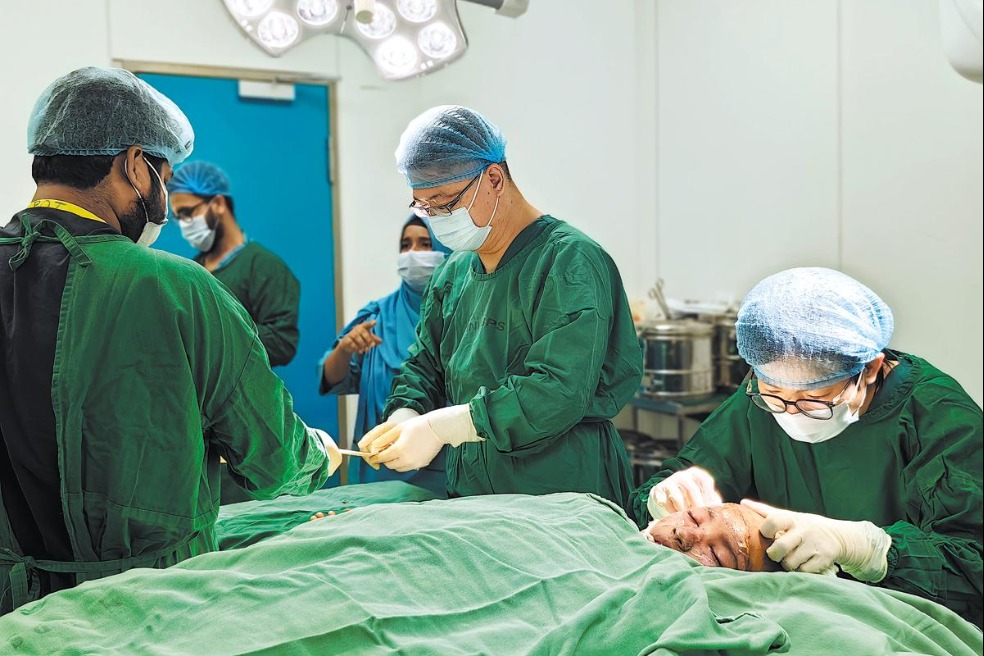Doctor's love is best medicine
When a young physician appeared in a village to set up practice, she ran into a wall of distrust. Fourteen years on, the locals treat her as one of their own, Yang Feiyue reports.

Two pairs of old-fashioned black shoes with rugged cotton soles stand out among an array of items, including awards certificates that exemplify Zhong Jing's work in improving rural health over the past 14 years.
The shoes are by no means finely finished and point to the arduous manual labor of a 90-year-old villager who touched Zhong's soul and made her decide to put down roots in Longhe village, Longchang town, Qianxinan Bouyei and Miao autonomous prefecture in Guizhou province.
"I've never been able to get over how she must have struggled across several kilometers of rough mountain roads just to send me these shoes,"Zhong says.
The anecdote is one of many that tell of the bond between Zhong and the village's 3,000 or so residents.
Rain or shine, Zhong opens the door of her clinic in the village no later than 7:30 am each day.
The clinic is the only place where the villagers can see a doctor and have their ailments tended without trekking further afield.
Zhong, 39, knows every one of her patients and their conditions, so her diagnoses are dispensed efficiently, with prescriptions that almost always seem to do the trick.
When villagers are on their work breaks, Zhong makes calls to some who have chronic diseases, such as high blood pressure, rheumatoid arthritis and diabetes.
"I need to remind them to come to have their blood pressure and blood sugar tested," she says.
If they can't make it, Zhong visits them.
"Patient visits to the clinic have become less frequent in recent years, thanks to the increasingly better health awareness of local villagers."
When Zhong settled down in Longhe in 2008, villagers' worries of having nowhere to turn to in a medical emergency evaporated.
"I live in the clinic, so they can see me at any time of the day, even in the middle of the night," Zhong says.
For the past two years, Zhong has made a point of making more house calls to those with chronic health conditions.
"This way they don't have to move around during the special (COVID-19) times," she says.
Winning the hearts
Zhong decided to leave her job at a hospital in the provincial capital, Guiyang, when her husband had been relocated for work in the town of Longchang in 2008.
"I didn't want us to have a long-distance relationship," she says.
Zhong had already visited Longhe in 2006, when she learned that many elderly villagers had arthritis or other age-related conditions, and that gynecological problems had rendered some women infertile.
So she set up the small clinic in the village, the only one there, by digging into her own pocket-20,000 yuan ($3,000), which was her life savings at the time.
Yet new surroundings were not the only thing to which she had to adapt in the new venture; she had to deal with the mistrust of villagers, too.
"There was no clinic in the village, and villagers saw a doctor only when serious health issues emerged,"Zhong says, adding that they were skeptical about her medical expertise because she was so young.
"If they had to see a doctor, they opted to go to hospitals in town, more than four hours' walk away."
Zhong then came up with a plan to encourage them to go to her.
"I said a first consultation would be free of charge, and only if they were completely satisfied with my diagnosis and prescription and returned for another visit would I charge."
Sick villagers whom Zhong had nursed back to good health were soon making return visits and paying for the service, and in quick order her good reputation had spread to nearby villages.
However, just as her practice began to thrive, fate served up a quandary for her.
After about six months in the village, her husband was transferred to the city of Xingyi, the seat of the prefecture, 80 kilometers from the village. Staying in the village alone was out of the question, Zhong says. However, there were others who were tugging at her heartstrings-the patients whose trust she had worked so hard to win.
"Soon some were coming in unsolicited to settle unpaid bills, and many invited me to their homes for meals."
Local villagers' obvious sadness at the prospect of seeing her leave prompted her to put a proposal to her husband.
"I would stay for six months and see how things work out," she says.
Zhong says she vividly remembers the day after her husband left.
"Many villagers waited outside my house early in the morning. They had prepared rice, chicken and vegetables as gifts, hoping to persuade me to stay."
The following six months turned out to be mutually therapeutic; Zhong helped soothe the villagers' pain while they warmed her to the core.
"They left food at my clinic and kept me company when I was distributing medication door to door," Zhong says.
She was especially touched when she learned an 87-year-old villager often thought of her in her last few days.
"That rarely happens in big hospitals. The relationship between villagers and doctors here is more like a family," she says.
When Zhong's husband visited her and saw the care the patients were giving her, he gave full support to her decision to keep practicing medicine in the village.
Efforts paid off
Zhong has bought better medical equipment for the local health center, including ultrasound equipment. About 40 percent of the women in the village have benefited from her efforts.
She has helped to set up digital health records for all villagers in Longhe. "If they go to a different hospital outside the village, their records can be readily available for better diagnosis and treatment," she says.
For her efforts she has won numerous awards, including the China Youth May Fourth Medal in 2012, and the Chinese Physician Award, the highest award in the country's physician industry, in 2018.
At the moment Zhong drops by a dozen households a day on her motorcycle. The roads have greatly improved, she says, meaning that a typical commute lasts little more than 10 minutes.
The village clinic, which once consisted of two small, shabby rooms, has been transformed. It is now housed in a three-story building in which patients' ailments are diagnosed on the first floor, traditional Chinese medicine treatment is dispensed on the second, and health lectures are held on the third.
More people have joined Zhong's cause, too.
Shuai Weiwei from Longchang town was inspired to join the clinic in 2018 after reading about her.
"Zhong's commitment to treating rural villagers is admirable," Shuai says.
"Some villagers always thank her in different ways, such as leaving local specialties at the clinic's door."
Zhong says: "I'm glad that I'm not only a doctor in the village now, but also a mediator of family conflicts and a bridge between local government and villagers. It feels great to be of some help and be trusted by them."
Speaking of her future, Zhong says she will continue to improve her expertise to meet the villagers' increasing demands for better health.
She is also keen to give full play to the advantages of traditional Chinese medicine in preventing or nipping diseases in the bud, so villagers can enjoy a higher quality of life.
In the village clinic, the black shoes from the old patient have claimed a special spot of their own.
"It's a constant reminder to me of remaining true to my original aspirations and continuing to stay on the right path," she says.
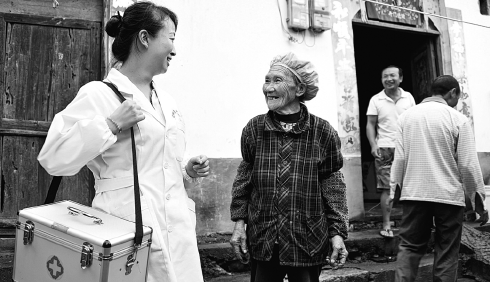
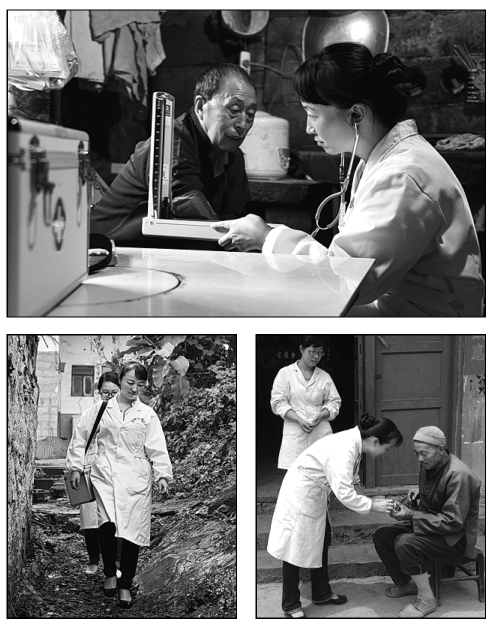
Today's Top News
- 12th Beijing Xiangshan Forum to be held from Sept 17-19
- 26 foreign leaders to attend China's V-Day commemorations
- Artificial intelligence can power Xizang's leap into a better future
- Export of trade in services a priority
- SCO helping develop a multipolar world order
- Tajikistan looks to China for deeper ties

















